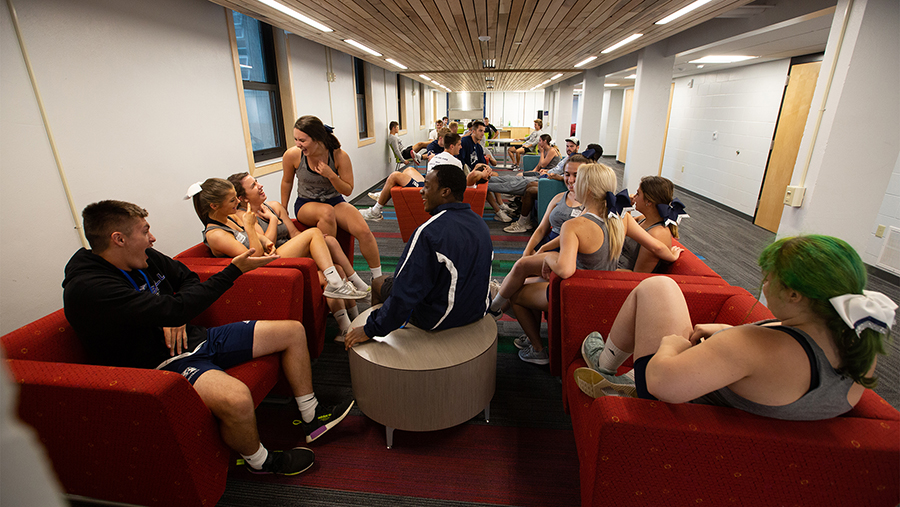University of Wisconsin-Stout has received $27,067 in Focus on Energy incentives through the design assistance program for work on a residence hall.
North Hall underwent a $21.74 million renovation, funded with student fees, that includes all new student rooms, bathrooms, common areas, entries and infrastructure. Built in 1967, the building has expanded 14,000 feet to about 90,000 square feet.

It reopened in September with 374 students living there. The renovation began in spring 2018. North Hall was closed during the 2018-19 academic year.
Focus on Energy incentives were from:
- Occupancy and vacancy lighting sensors throughout the building
- LED lighting throughout the building that reduced the lighting power density by 40% to 50%
- Watersense certified showerheads to reduce hot water consumption
- Energy-efficient insulation in new bathroom walls and roof
- Energy-efficient windows in dorm rooms and commons areas
“This project is important because buildings are a huge contributor to our global greenhouse gas emissions,” said Sarah Rykal, UW-Stout sustainability manager. “We spend much of our time in buildings, and we use a lot of resources to make them and live or work within them. So, when we do renovations like North Hall, we want to make sure we’re reducing energy consumption and making the building more sustainable by the time the renovation is complete.
“Incorporating LED lighting, occupancy sensors for lighting, energy-efficient windows and insulation, and water fixtures that conserve hot water all help to reduce energy within our buildings in ways that have little to no impact on the residents but reduce both our greenhouse gas emissions and our energy bill. It’s a win-win for everyone,” Rykal said.
The funds the university receives from Focus on Energy go back into energy projects on campus to help fund future projects, said Zenon Smolarek, associate director of Facilities Management. “Every dollar counts,” Smolarek said. “The Focus on Energy process can be labor intensive but worth it in the end.”
According to a report filed with Focus on Energy, it will take about five years to pay off the energy-efficiency projects with energy savings, which will be about $32,000 a year.
“Focus on Energy is an excellent program that incentivizes our campus to reduce energy consumption,” Rykal said. “We are always grateful when we can make a renovation or new construction project more energy-efficient and get financial incentives to do it.”
It is Wisconsin utilities' statewide energy efficiency and renewable resource program funded by the state's investor-owned energy utilities and participating municipal and electric cooperative utilities. Focus on Energy works with eligible Wisconsin residents and businesses to install cost-effective energy efficiency and renewable energy projects. Its efforts help Wisconsin residents and businesses manage rising energy costs, promote in-state economic development, protect the environment and help control Wisconsin's growing demand for electricity and natural gas.
Sustainability at UW-Stout
The Princeton Review named UW-Stout one of the top “green” colleges in 2018. The education services company’s Guide to 399 Green Colleges profiles schools that are the most committed to sustainability. The schools were selected based on their academic offerings, campus policies, initiatives, activities and career preparation for students.
 The campus is a Charter Signatory of the American College and Universities President’s Climate Commitment, an effort to address climate change by committing the campus to neutralize greenhouse gas emissions.
The campus is a Charter Signatory of the American College and Universities President’s Climate Commitment, an effort to address climate change by committing the campus to neutralize greenhouse gas emissions.
Areas of environmental stewardship and sustainability that helped UW-Stout make the list include: a Sustainability Steering Committee; sustainability-focused undergraduate and graduate degree programs; part of the university food budget allocated to local and organic food; and transportation options, including Bikeshare, car-sharing and car/van pooling programs, free or reduced-price transit passes, a free shuttle program and free or reduced parking passes for car/van pooling vehicles.
The university has a campuswide composting initiative, filtered water hydration stations across campus to cut down on disposable water bottle usage. Dining services offers reusable food containers for takeout, reducing throwaway containers. Participants do have to initially buy containers for the program.
Learn more at the Sustainable Stout website.
UW-Stout is Wisconsin’s Polytechnic University, with a focus on applied learning, collaboration with business and industry, and career outcomes.
###
Photos
Students gather in a common area of UW-Stout’s North Hall. The residence hall has earned incentives for its energy savings.
Sarah Rykal
Zenon Smolarek






